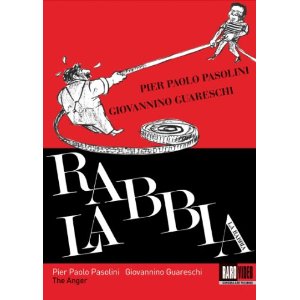Guest Review by DAMON SWINDALL
La Rabbia (aka The Anger) is a very interesting and different type of documentary. Its attempt is to give different points of view in relation to the question “Why are our lives characterized by discontent, anguish and fear?” For this job they turned to directors Pier Paolo Pasolini and Ginovanni Guareschi to give their left-wing and conservative views, respectively. If that idea weren’t interesting enough the two shoot no new footage and use only editing techniques and voice over narration to enhance clips from old news reels. The two very different directors get half of the film, about 50 minutes each, to get their point across. Both segments have their high and lows but this very polarizing doc is not for everyone.
This is a very hard film to try and review. It would be almost impossible to be completely objective over something with such disparate social and political topics and not throw in your own bias or sociopolitical leaning. I’m going to attempt to stay away from as much of the actual pros and cons of the filmmakers’ opinions as possible, but you have to mention it a little.
Guareschi’s half, the second half, is the more controversial and the one that would shock most people – even some of today’s conservatives. As he says in a letter to Pasolini in an included booklet “as a member of the right wing bourgeoisie, when I see a black man cutting a white man’s throat I say ‘poor white man’. You say ‘poor black man’. Yet, as a result of my solidarity with the Caucasian race, you accuse me or racism.” As you can see Guareschi tries hard to justify his feelings but in the film, and even in that statement, his true self shines through regardless. All of his responses to the questions posed are slanted for the well-to-do and white while any and every negative image of other races and the lowest classes is used. This gets quite infuriating at times, so much so that Pasolini wanted his name removed from the film altogether and it never really played anywhere.
Then we have Pasolini’s half, which screams in every second of someone more liberal and caring. All of the narration is not just read but rather performed in a poetic style breathing a life of artistic vision to his message. He champions the proletariat and countrymen that his counter lambasts. Though both of the directors touch on some very serious subjects, this half is much lighter overall and probably won’t leave you seething. An odd choice to put the more controversial segment second so that your audience walks away angry.
All of the newsreel footage used is quite interesting. Sometimes beautiful and sometimes shocking but it gives a glimpse into many things never seen by a couple generations – but this is also a problem. So much of the film relies on the audience’s knowledge of the people shown in the remixed footage and when they are not mentioned in the narration or by onscreen text it’s not easy. With my very limited scope in the world of post-war Italian and other European political figures much of the film is lost. This is not the most accessible film for today’s generation to say the least.
On this DVD release, which is great, there are many features and extras to keep you watching. There is a feature length documentary, La Rabbia I, La Rabbia II, La Rabbia III… L’Arabia, that examines all aspects of these films, their footage and commentary on everything. A Pasolini short, Le Mura di Sana’a, is included as well as a handful of trailers for the feature cut in different ways for differing audiences. The prize of the release, other than the great transfer, is a 23-page booklet with essays, letters and other observations about La Rabbia and its sordid past. A great read.
It is really hard to recommend watching this film to anyone because of how hard it is to follow, and because the narration can be quite dull at times. If it didn’t rely so much on knowledge outside of the film about a time that many people today, myself included, never lived through it would be easier to follow. Still, you can find a lot of common clashing between Pasolini and Guareschi than you can between our own Republican and Democratic parties. Thanks and appreciation must go to Raro Video for releasing such and interesting relic of filmmaking from Italy’s past with such a radical idea. Keep putting out this kind of material to open the world to new intriguing films.

